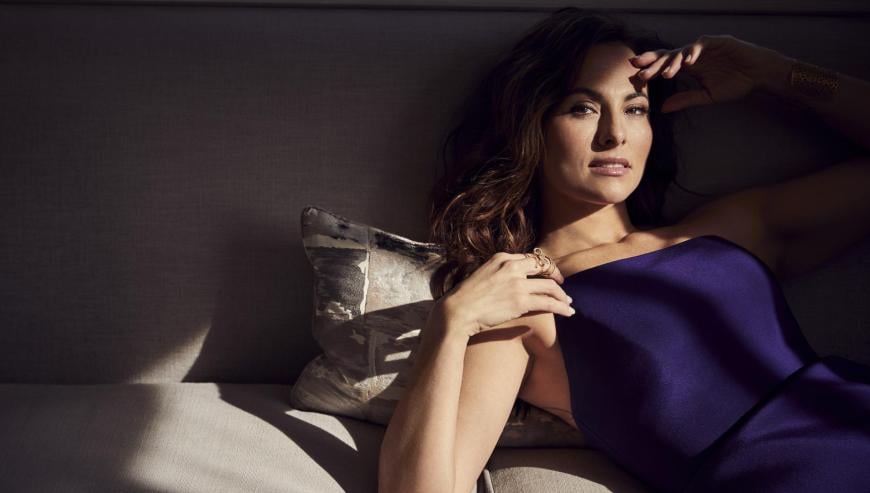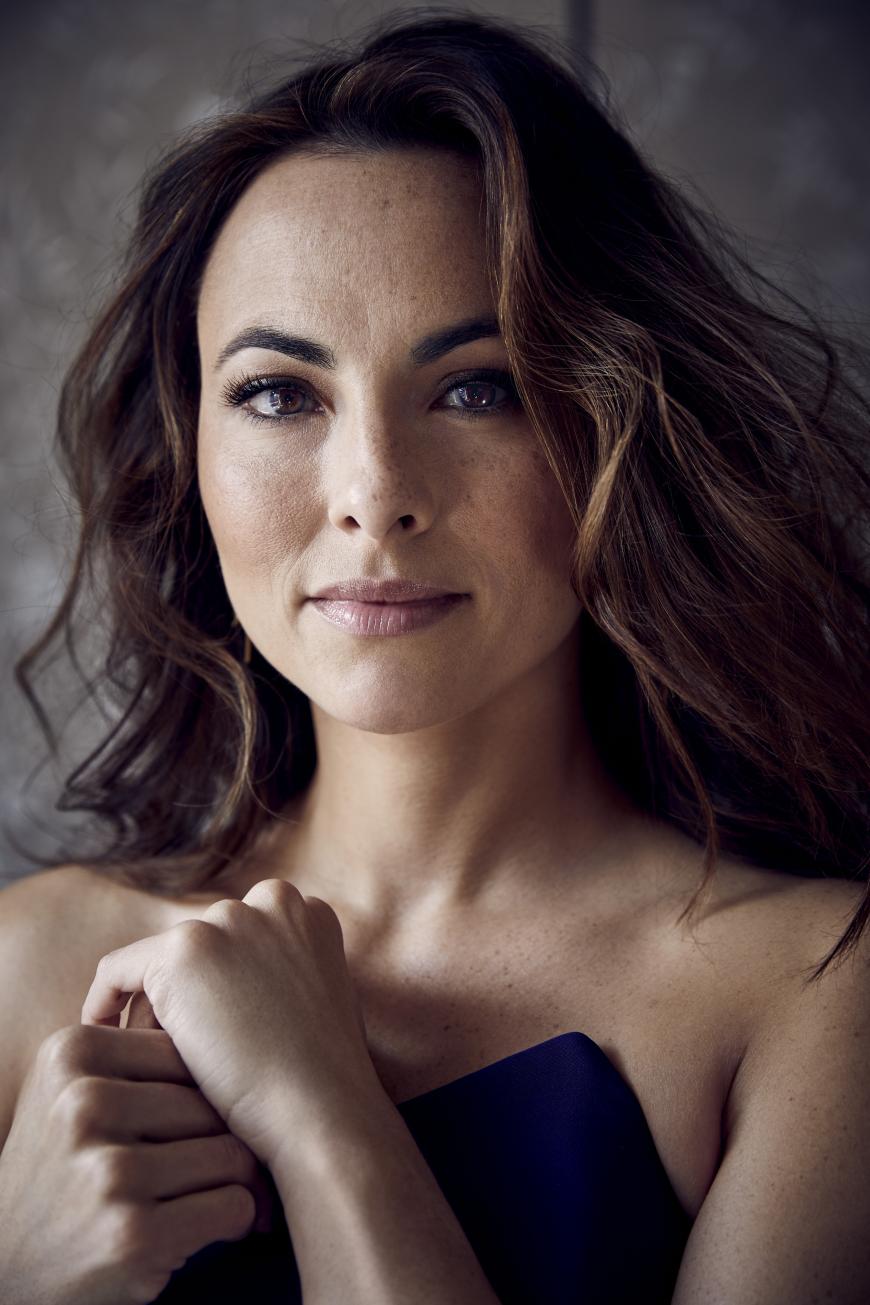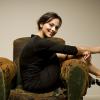
Born and bred in New York City, the three-time Grammy Award-winning mezzo-soprano Isabel Leonard has been raising temperatures in opera houses around the world since making her Metropolitan Opera debut in 2007 as Stéphano in Charles Gounod’s Roméo et Juliette. Anne Midgette, writing in The New York Times, described the then-25-year-old Leonard, who has since become a staple at the Met, as singing “with the assurance of one who feels completely at home on the stage, wielding an easy mezzo that went up from an amber-colored lower register to an impressive, soprano-like top.”
While she gave a recital under the auspices of Los Angeles Opera last year, Leonard is now preparing for her mainstage debut here as Donna Elvira in Mozart’s Don Giovanni. The production will open LA Opera’s 38th season and run Sept. 23 – Oct. 15 at the Dorothy Chandler Pavilion and will also be livestreamed for free at the Santa Monica Pier and at La Mirada Community Regional Park on opening night. Don Giovanni will be followed by Rossini’s The Barber of Seville, Oct. 21 – Nov. 12, with Leonard singing Rosina, one of her signature roles at the Met.
After earning bachelor’s and master’s degrees from Juilliard, where she also won the William Schuman Prize for outstanding achievement and leadership in music — and after her auspicious Met debut — Leonard has been much in demand. Last season alone, she made her house debuts at Houston Grand Opera as Charlotte in Jules Massenet’s Werther and at La Scala as Miranda in Thomas Adès’s The Tempest.
No stranger to contemporary opera, Leonard has sung the title role in Nico Muhly’s Marnie, which had its American premiere at the Met in 2018, and also appeared as Ada, opposite Nathan Gunn’s Inman, in the world premiere of Jennifer Higdon’s Cold Mountain at Santa Fe Opera in 2015.
Now 41, the award-winning mezzo has appeared with preeminent orchestras like The Cleveland Orchestra and the Vienna Philharmonic. And with her fashion-model looks, it’s also no surprise that she’s been featured in Vogue and Town & Country magazines, in addition to having film and television credits to her name. Having made an appearance earlier this year in Rebecca Miller’s romantic comedy She Came to Me, the singer can also be seen in Bradley Cooper’s upcoming Leonard Bernstein biopic, Maestro.
SF Classical Voice spoke with Leonard about her attraction to contemporary opera, how having a baby changed her as a singer, and the current state of the art form, among other topics.
Growing up in New York City, your family was immersed in the cultural scene, and you began studying dance at the Joffrey Ballet School when you were 5. How has your dance training helped you in opera?
I don’t think I ever wanted to be a ballet dancer, even though I was studying for a long time. I think I knew in my heart and soul it wasn’t going to be my career. I didn’t know for certain I wanted to be an opera singer, but I did know that I wanted to be involved in the theater in some way. I did musical theater in college, and I had to make a choice between New York University — and music theater — and Juilliard. I ended up with a classical education.
In dance, it’s about being 100 percent able to move, to have good physical control over your body and be able to tell stories — physically tell stories. That is helpful for any kind of theater work.

You’re making your mainstage debut with LA Opera as Elvira in Don Giovanni and as Rosina in The Barber of Seville. What are your thoughts on this double-whammy kind of debut?
It’s great and a lot of fun. I’ve certainly sung roles back-to-back at other companies. But it’s just fun in that you get to be different characters over the course of the year. It’s lovely to finally be able to debut in Los Angeles. We’ve been trying to make it happen for years; sometimes schedules kept missing, or they didn’t match up right. But it’s lovely and always nice to work for a company that you haven’t worked for yet.
You’ve worked before with Lucas Meachem, who sings the title role in Don Giovanni, and Rob Ashford, who’s making his LA Opera debut directing The Barber of Seville. How does that affect the process?
I’ve known Lucas for a long time, and it’s lovely to work with people you know, that you enjoy being around. We’re colleagues, of course, but being friends is an added bonus. You already have a developed trust with them and can get into conversations with them with ease. That’s always effective when you’re trying to tell stories together.
I’ve also known Rob for a while. We had such a great time when we did this production together at Chicago Lyric. That would have been 2014. He’s lovely, and there’s a collaborative energy. We’re putting on this production rather quickly, and it requires clarity and flexibility to get it up on its feet but also infuse it with our own personal takes.
How do you prepare for a role — musically, physically, psychologically? And what about doing the same role in different productions?
That’s our bread and butter: doing the same role in many different productions. You become accustomed to it as an opera singer. If you do something many, many times, you bring experiences and ideas from the past to new productions. And some [singers] work within new frameworks and some don’t. What tends to happen when you revisit a character [is] you learn something new and find something new.
I’ll say that, for me, it has a lot more to do with the psychology of it. I don’t want to say it’s a slowly evolving thing, but … it’s a slow building from the inside out. As you get to understand more and more why the [characters] say something or feel something, then the body starts to come along and reflect those feelings.
A character gets developed physically and mentally as you go through rehearsals, and there are processes for all kinds of different stagings. Oftentimes, it’s also helpful in a new production to be able to feel what the space is like, get an overview, and you can start filling in the blanks.
What attracts you to contemporary opera? What are the challenges?
Any time I’ve done a contemporary piece, it’s because it’s character-driven. I wanted to play that character and had the desire to inhabit the mental space of that character. The storytelling and the story itself — that’s the main attraction. If you know a composer, you know the music is going to be beautiful, and the desire to get into the headspace of these characters is really interesting.
[As for] challenges, there are challenges like you would have in any work. When you’re doing a contemporary opera, there are not a lot of performances and practice you can draw from. Usually, there are none at all. It’s a challenge, yes, but it’s also liberating. Because you’re creating something from scratch, you have a lot of freedom in that process. You’re not worried by the thought of “this is how everybody’s done it, so I should do it this way, too.” There’s a freedom, but it’s also a responsibility, in the best way, when portraying a new character.
How did having a baby change you as a singer, and what are the challenges in raising your son as a single mother while making your art?
Motherhood for women across the globe has its beauty and its challenges. I’m a firm believer [that] having a support system is the best way to do it, but not everybody has that. Most of my support system has been nannies. I always say it’s complicated at best; you don’t really ask yourself whether you can or cannot do it. The option of “no, I can’t” is not available. You just do it.
It can be thoroughly exhausting, and sometimes you question your life choices. I couldn’t have picked a more challenging career. It’s easy to become neurotic about your art as a singer, what one needs as a performer to be your best, to be in top shape. When you have a kid, you don’t get 100 percent of the things you need to do your job. You have to function without those things.
In general, it makes you a little more grounded, where your life is not just the music you create. It has another facet — a deep facet. That is very valuable. It’s valuable to be rooted in reality, and having a kid can do that to you.

You’re super active on Instagram and have nearly 100,000 followers. Do you do your own posting, as you’re very open, and if so, when do you have the time?
I don’t know. I guess I don’t sleep. Basically, it’s one of those things I check pretty frequently. I’m very quick about it, and I know things I’m OK about posting.
Being open? We all have our moments, and I’m down-to-earth because we live in a pretend world in the business. I love being these other characters onstage and making them as real as possible, and [that’s] why I’m in this in the first place. I really respect my life — it’s real and clear and simple. I don’t like playing games; I have enough drama onstage.
What do you think of the state of opera today? Are you seeing more young people in the audience?
Audiences vary from state to state, theater to theater, country to country. I can’t always tell who exactly is in the audience. I think there’s always a mix. The young people I know who go are usually musicians or aspiring singers, so I don’t know how many [other] young people go. I do think that opera has an interesting challenge, as it’s always had, to be a relevant art form, to be enticing for the audience to experience the music and to develop sort of an ownership of it as well.
It’s not culturally ingrained, at least here in the States, like in Europe. I think that’s part of the challenge — how to make it something that perhaps the general public would feel like they want to make part of their life. There’s this trope about it being cost prohibitive. Look at Hamilton tickets, going to a basketball game and sitting court[side]. These all can be prohibitive.
But you can get cheap tickets at the Met. There are many ways of making it a less expensive evening than what people think it is. If somebody thinks it’s too expensive, they have not in their mind decided what the value of it is for them. People spend money on all sorts of things. They’re willing to invest in a Taylor Swift concert. It’s a matter of how you create a public that wants to invest in these kinds of experiences.




